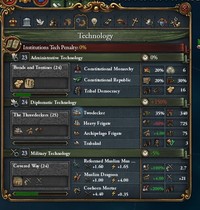Part 52: World of 1700
Chapter 20 – World of 1700 : Assalamu alaykum, and a good morning to this assembly’s most noble emirs and sheikhs, most worthy merchants and traders, most honoured imams and muftis.
: Assalamu alaykum, and a good morning to this assembly’s most noble emirs and sheikhs, most worthy merchants and traders, most honoured imams and muftis. : This is a tenuous time for Iberia, as I’m sure no one needs reminding, and we must be wary in our walk lest we trip and doom this noble sultanate. So whilst the initial factions of the Majlis Meeting were being hammered out, I set a small party of learned scholars, navigators and cartographers to mapping out everything we know of the world, along with detailed notes on many of its kings and queens.
: This is a tenuous time for Iberia, as I’m sure no one needs reminding, and we must be wary in our walk lest we trip and doom this noble sultanate. So whilst the initial factions of the Majlis Meeting were being hammered out, I set a small party of learned scholars, navigators and cartographers to mapping out everything we know of the world, along with detailed notes on many of its kings and queens.  : I hope the information and intelligence we’ve gleaned proves useful in your policy-drafting. I’m sure you’re all very busy, however, so let’s get down to business.
: I hope the information and intelligence we’ve gleaned proves useful in your policy-drafting. I’m sure you’re all very busy, however, so let’s get down to business.
 : To begin with the most blessed and prosperous nation on Allah’s earth, the Sultanate of Al Andalus has been through a difficult few years.
: To begin with the most blessed and prosperous nation on Allah’s earth, the Sultanate of Al Andalus has been through a difficult few years. : I will not reiterate the many toils my kingdom has been put through, instead I’ll get straight down to facts. The peoples of Iberia are many and varied, with the dominant Arab-Andalusi casting a large shadow over the Castilian, Catalan and Aragonese peoples, along with a scattering of other minorities.
: I will not reiterate the many toils my kingdom has been put through, instead I’ll get straight down to facts. The peoples of Iberia are many and varied, with the dominant Arab-Andalusi casting a large shadow over the Castilian, Catalan and Aragonese peoples, along with a scattering of other minorities.
 : In addition to this, the religious landscape of the peninsula has dramatically changed over the past century. Though Sunni Islam is still dominant, minority faiths have sunk their roots deep, with the Shia, Zikri and Yazidi sects have all multiplied in recent years.
: In addition to this, the religious landscape of the peninsula has dramatically changed over the past century. Though Sunni Islam is still dominant, minority faiths have sunk their roots deep, with the Shia, Zikri and Yazidi sects have all multiplied in recent years. : With the population covered, let’s move on to the state of governance. Obviously, I currently rule as Sultan of Al Andalus, with my younger brother Ibrahim serving as my heir until I have a son.
: With the population covered, let’s move on to the state of governance. Obviously, I currently rule as Sultan of Al Andalus, with my younger brother Ibrahim serving as my heir until I have a son.
 : And whilst the Jizrunids have survived the past century, the Reformed Taifa system has not. The Fitna of al-Andalus raged for ten long years, with the Majlis emerging triumphant after a dogged fight, transforming the sultanate into a Constitutional Monarchy and ensuring that no Sultan would ever again rule with impunity.
: And whilst the Jizrunids have survived the past century, the Reformed Taifa system has not. The Fitna of al-Andalus raged for ten long years, with the Majlis emerging triumphant after a dogged fight, transforming the sultanate into a Constitutional Monarchy and ensuring that no Sultan would ever again rule with impunity.
 : The ascendence of the Majlis has also seen a blossoming of its values, with many persons in this very hall calling for tolerance, tolerance for minority cultures who REBELLED against our rule, tolerance for divergent faiths that THREATEN our values, tolerance for those who would seek to DESTROY THE VERY FOUNDATIONS OF THIS SULTANATE!
: The ascendence of the Majlis has also seen a blossoming of its values, with many persons in this very hall calling for tolerance, tolerance for minority cultures who REBELLED against our rule, tolerance for divergent faiths that THREATEN our values, tolerance for those who would seek to DESTROY THE VERY FOUNDATIONS OF THIS SULTANATE! : Ahem. I apologise, got a bit carried away. To, um, move past the rights of the dhimmi peoples, the past hundred years has also seen an increasing focus on the military, the most vital tools of any nation. Already, a new generation of officers and soldiers are being trained and inducted into the Mubazirun, now sworn to serve the Majlis above all else.
: Ahem. I apologise, got a bit carried away. To, um, move past the rights of the dhimmi peoples, the past hundred years has also seen an increasing focus on the military, the most vital tools of any nation. Already, a new generation of officers and soldiers are being trained and inducted into the Mubazirun, now sworn to serve the Majlis above all else.
 : Meeting the same fate as the army, the Fitna of al-Andalus also destroyed the economy of Iberia, with thousands slaughtered and trade plummeting all across the peninsula. The sultanate is now heavily indebted to Provencal moneylenders and Italian banks, who hold a stranglehold over our finances until we can right them.
: Meeting the same fate as the army, the Fitna of al-Andalus also destroyed the economy of Iberia, with thousands slaughtered and trade plummeting all across the peninsula. The sultanate is now heavily indebted to Provencal moneylenders and Italian banks, who hold a stranglehold over our finances until we can right them. : Slowly but surely, however, we are beginning to recover. All unnecessary expenses have been cut, inflation is being curbed in, shipments of gold are put to repaying loans...
: Slowly but surely, however, we are beginning to recover. All unnecessary expenses have been cut, inflation is being curbed in, shipments of gold are put to repaying loans...
 : And that should bring the first section of this briefing to an end. With the affairs of Iberia now fresh in the mind, we can take a step back and have a better look at Europe, the gears that turn the world.
: And that should bring the first section of this briefing to an end. With the affairs of Iberia now fresh in the mind, we can take a step back and have a better look at Europe, the gears that turn the world.
 : The two behemoths of the continent are still the Kingdom of France and the Celtic Empire, both of whom are currently embroiled in a bloody war.
: The two behemoths of the continent are still the Kingdom of France and the Celtic Empire, both of whom are currently embroiled in a bloody war.  : The ó Kildare dynasty still rules in Hibernia, an unbroken line that stretches back to the Middle Ages, when the crowns of Ireland and Scotland were still separated. In France, on the other hand, the Elective Monarchy was abolished in favour of absolutism by the Bo’ilas kings, who once reigned in the Kingdom of Italy.
: The ó Kildare dynasty still rules in Hibernia, an unbroken line that stretches back to the Middle Ages, when the crowns of Ireland and Scotland were still separated. In France, on the other hand, the Elective Monarchy was abolished in favour of absolutism by the Bo’ilas kings, who once reigned in the Kingdom of Italy.

 : Two rapidly rising powers are beginning to nibble at the heels of France and the Celtic Empire, however. The Grand Duchy of Bavaria and Kingdom of Provence are closely allied with one another, with Bavaria eager for revenge against France for its heavy defeats during the League War.
: Two rapidly rising powers are beginning to nibble at the heels of France and the Celtic Empire, however. The Grand Duchy of Bavaria and Kingdom of Provence are closely allied with one another, with Bavaria eager for revenge against France for its heavy defeats during the League War. : Provence, meanwhile, tells a very different story. Once a powerful Merchant Republic whose influence stretched from Gharbia in the west to the Holy Land in the east, Provence collapsed to a dictatorship after its republican ideals were eroded through constant corruption and nepotism, with the d’Anjou dictator declaring himself King of Provence and Occitania shortly afterwards.
: Provence, meanwhile, tells a very different story. Once a powerful Merchant Republic whose influence stretched from Gharbia in the west to the Holy Land in the east, Provence collapsed to a dictatorship after its republican ideals were eroded through constant corruption and nepotism, with the d’Anjou dictator declaring himself King of Provence and Occitania shortly afterwards.

 : That covers the great powers of Europe, but before moving on to the rest of the world, let us linger for a moment with Palermo.
: That covers the great powers of Europe, but before moving on to the rest of the world, let us linger for a moment with Palermo. : The Jizrunid Emirs of Palermo were on the rise not too long ago, very nearly uniting the entirety of the Italian peninsula under the banner of Sunni Islam. A devastating civil war and disastrous defeat by Provence has brought their ascendance to a sudden halt, however, with the emirate now confined to southern Italy.
: The Jizrunid Emirs of Palermo were on the rise not too long ago, very nearly uniting the entirety of the Italian peninsula under the banner of Sunni Islam. A devastating civil war and disastrous defeat by Provence has brought their ascendance to a sudden halt, however, with the emirate now confined to southern Italy.
 : That brings the powers of Europe to an end, so let's move southward and consider the two dominant kingdoms of North Africa: Morocco and Crusader Egypt.
: That brings the powers of Europe to an end, so let's move southward and consider the two dominant kingdoms of North Africa: Morocco and Crusader Egypt.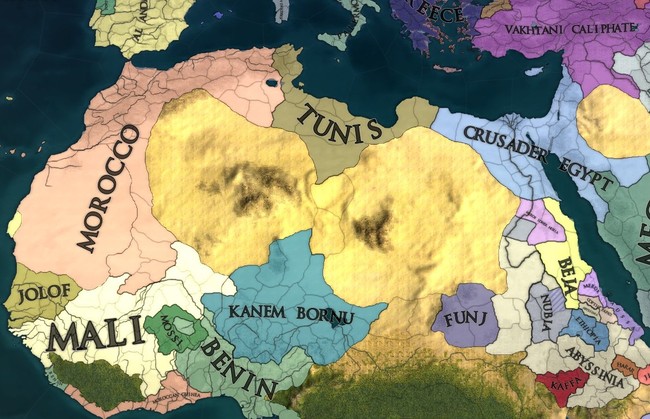
 : The Almoravids of Morocco have been arch-rivals to the Jizrunids of Al Andalus for centuries now, rivalled to one another both politically and religiously. Whilst Andalusia descended into civil war, however, Morocco managed to expand its colonial holdings until they stretched from Gharbia to the East Indies. They now present a formidable threat to Muslim Iberia, and a reckoning is quickly becoming inevitable.
: The Almoravids of Morocco have been arch-rivals to the Jizrunids of Al Andalus for centuries now, rivalled to one another both politically and religiously. Whilst Andalusia descended into civil war, however, Morocco managed to expand its colonial holdings until they stretched from Gharbia to the East Indies. They now present a formidable threat to Muslim Iberia, and a reckoning is quickly becoming inevitable. : Crusader Egypt, meanwhile, could prove to be a useful ally in the event of war. The beacon of Christendom in the Middle East, the Crusaders are surrounded by enemies in every direction, surviving through a combination of feudalistic zealotry and sheer luck.
: Crusader Egypt, meanwhile, could prove to be a useful ally in the event of war. The beacon of Christendom in the Middle East, the Crusaders are surrounded by enemies in every direction, surviving through a combination of feudalistic zealotry and sheer luck.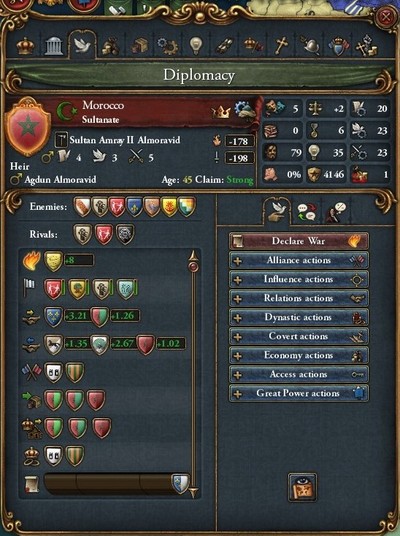
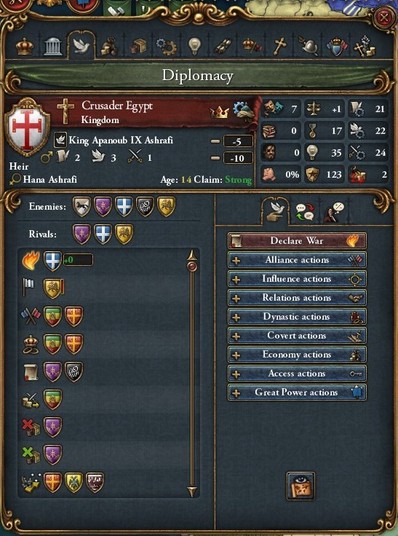
 : Now, let us push eastward and towards the Holy Land, the crossroads of empires. Apart from Crusader Egypt itself, the Near East had largely been dominated by the Vakhtani Caliphate for centuries without interference, an empire that stretched from Constantinople to Jerusalem. In recent years, however, the hold of the Armenians has begun to falter, with its rivals encroaching on its borders and inciting constant wars that gradually bled their resources dry.
: Now, let us push eastward and towards the Holy Land, the crossroads of empires. Apart from Crusader Egypt itself, the Near East had largely been dominated by the Vakhtani Caliphate for centuries without interference, an empire that stretched from Constantinople to Jerusalem. In recent years, however, the hold of the Armenians has begun to falter, with its rivals encroaching on its borders and inciting constant wars that gradually bled their resources dry.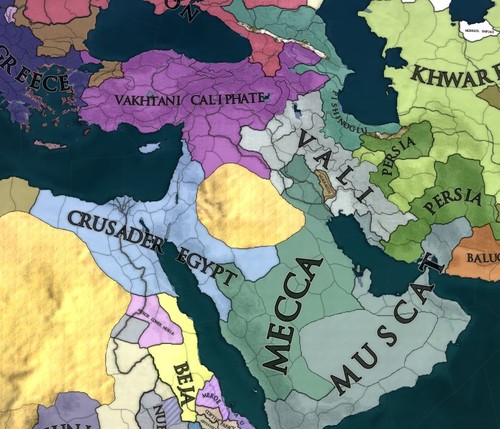
 : Unless the Caliph manages to unite his diverse territories under a common cause once more, then the next century may well witness the decline of the Vakhtani Empire.
: Unless the Caliph manages to unite his diverse territories under a common cause once more, then the next century may well witness the decline of the Vakhtani Empire. : If one state benefits from the fall of the Armenians, however, then it would their neighbours in the Vali Emirate. The small Kurdish dynasty has rapidly expanded into Arabia and Persia over the past century, rising from an insignificant city-state to become an influential voice in the region.
: If one state benefits from the fall of the Armenians, however, then it would their neighbours in the Vali Emirate. The small Kurdish dynasty has rapidly expanded into Arabia and Persia over the past century, rising from an insignificant city-state to become an influential voice in the region.
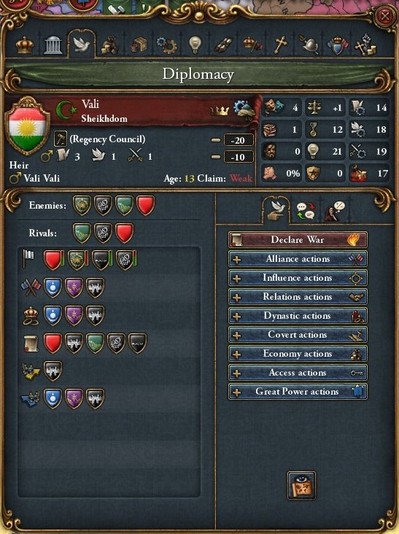
 : Pushing further north, the vast swathes of bitterly cold land that makes up Eastern Europe has come to be dominated by two great powers: Smolensk and Novgorod.
: Pushing further north, the vast swathes of bitterly cold land that makes up Eastern Europe has come to be dominated by two great powers: Smolensk and Novgorod.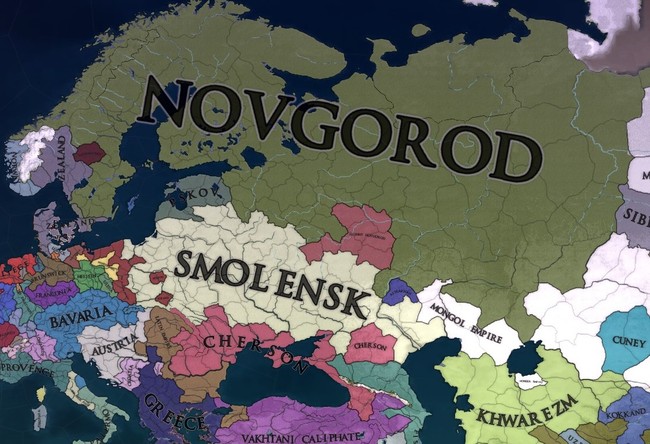
 : The destruction of Orthodox Russia was once a very real threat, as the Mongols swept aside any resistance that the weak principalities of Rus put up. The Muslim onslaught was only brought to a halt by an alliance between the two largest Russian kingdoms, who have since risen to dominate everything from Poland to Siberia.
: The destruction of Orthodox Russia was once a very real threat, as the Mongols swept aside any resistance that the weak principalities of Rus put up. The Muslim onslaught was only brought to a halt by an alliance between the two largest Russian kingdoms, who have since risen to dominate everything from Poland to Siberia. : Both kingdoms are currently ruled by regents, but a Rurikid prince is poised to become Tsar of Smolensk, the heir of an ancient and famous dynasty. Novgorod, meanwhile, has seen prosperous years under the Roman dynasty, their domains now stretching from Scandinavia to Siberia.
: Both kingdoms are currently ruled by regents, but a Rurikid prince is poised to become Tsar of Smolensk, the heir of an ancient and famous dynasty. Novgorod, meanwhile, has seen prosperous years under the Roman dynasty, their domains now stretching from Scandinavia to Siberia. 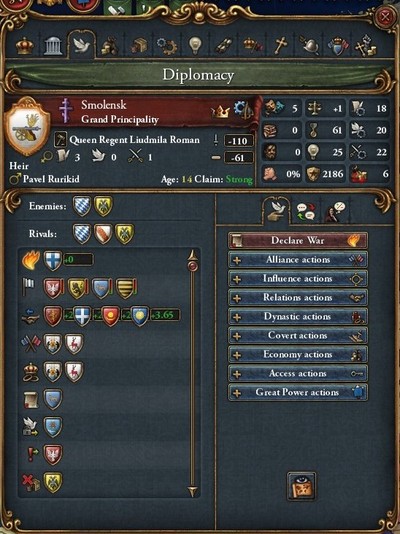
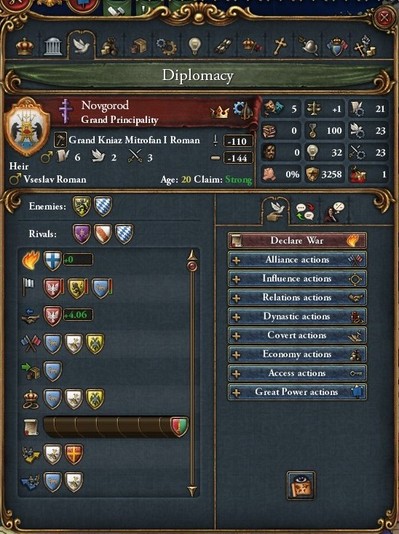
 : That brings us up to date with the affairs of the principal western powers, so let us move further east, starting with Persia.
: That brings us up to date with the affairs of the principal western powers, so let us move further east, starting with Persia. : The Farzadid Shahs of Persia were once the greatest dynasty in the Muslim world, with everything from Baluchistan to Trebizond ruled from Isfahan. But the venerable dynasty has since died out, with their empire exploding into half a dozen warring principalities as it did so, allowing the foreign powers of Vali, Pishinoglu and Khwarezm to rapidly expand into its remnants.
: The Farzadid Shahs of Persia were once the greatest dynasty in the Muslim world, with everything from Baluchistan to Trebizond ruled from Isfahan. But the venerable dynasty has since died out, with their empire exploding into half a dozen warring principalities as it did so, allowing the foreign powers of Vali, Pishinoglu and Khwarezm to rapidly expand into its remnants. 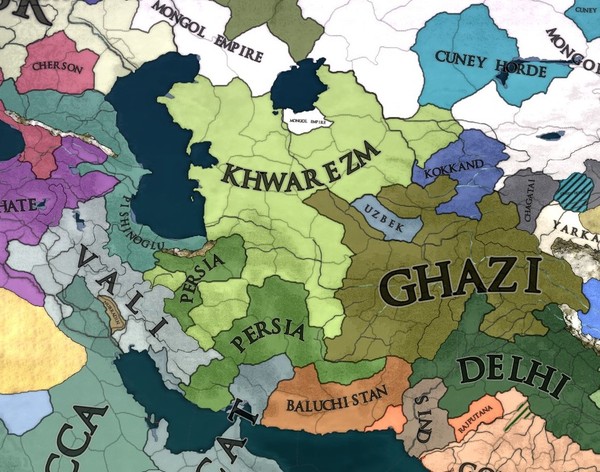
 : Further east, meanwhile, India is similarly divided between a handful of large, rich kingdoms. Along the southern end of the subcontinent, meanwhile, the Almoravid Sultanate of Morocco has gradually been expanding, bringing large parts of Ceylon and Madurai under its rule.
: Further east, meanwhile, India is similarly divided between a handful of large, rich kingdoms. Along the southern end of the subcontinent, meanwhile, the Almoravid Sultanate of Morocco has gradually been expanding, bringing large parts of Ceylon and Madurai under its rule. 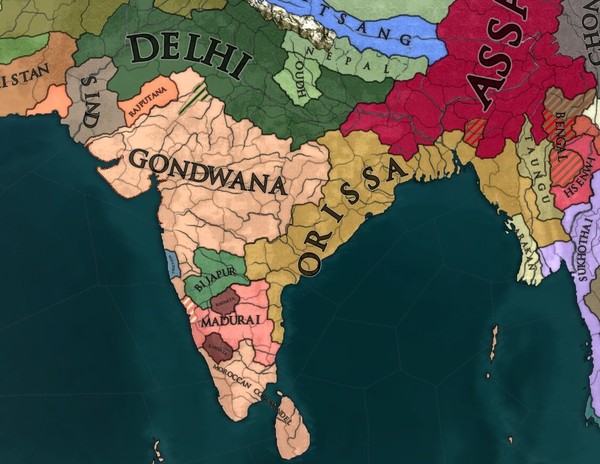
 : The immensely rich and enormously influential Cedi family did nothing to stymie the Berber advance, however. Ruling over the twin powers of Delhi and Gondwana, the Cedi Rajas were too focused on their own petty conflicts and family squabbles to see their approaching demise.
: The immensely rich and enormously influential Cedi family did nothing to stymie the Berber advance, however. Ruling over the twin powers of Delhi and Gondwana, the Cedi Rajas were too focused on their own petty conflicts and family squabbles to see their approaching demise.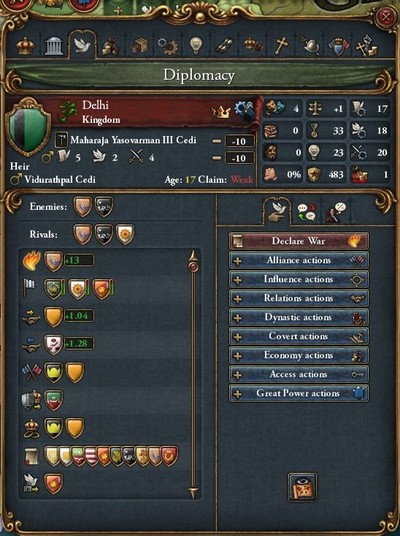
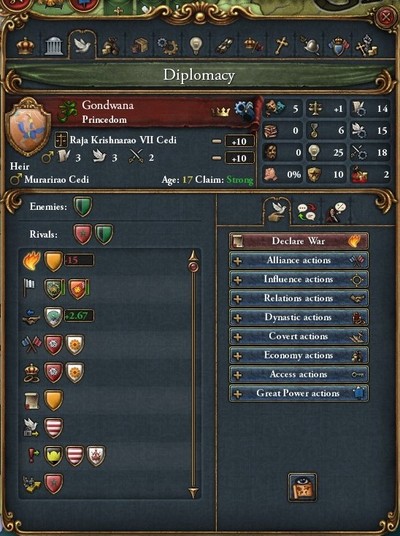
 : And with that, we finally come to the eastern reaches of the old world.
: And with that, we finally come to the eastern reaches of the old world.  : With the fall of the Great Feng Empire, the vast lands and rich coasts of China has become a permanent warzone, with devastating bloodshed exploding between the fiercely-rivalled powers every few months. As the months turned to years and the years to decades, China has gradually come to be known as the "Land of a Thousand Emperors", all constantly feuding with one another as they attempted to usurp the Mandate of Heaven.
: With the fall of the Great Feng Empire, the vast lands and rich coasts of China has become a permanent warzone, with devastating bloodshed exploding between the fiercely-rivalled powers every few months. As the months turned to years and the years to decades, China has gradually come to be known as the "Land of a Thousand Emperors", all constantly feuding with one another as they attempted to usurp the Mandate of Heaven.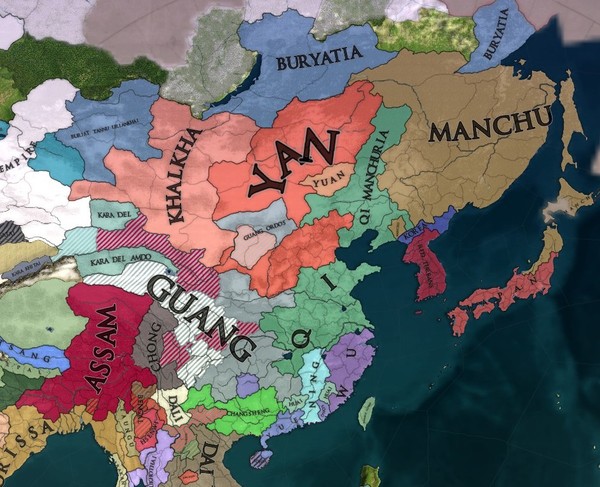
 : Southeast Asia, on the other hand, in carved between two or three regional powers. The Mahayana and Jainist thallocracies of Jangala and Poni are fiercely rivalled to one another, regularly clashing as both attempt to wrench the rich trade straits from one another.
: Southeast Asia, on the other hand, in carved between two or three regional powers. The Mahayana and Jainist thallocracies of Jangala and Poni are fiercely rivalled to one another, regularly clashing as both attempt to wrench the rich trade straits from one another.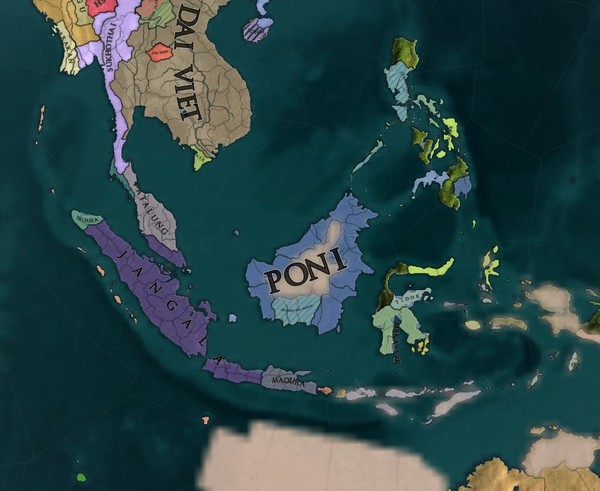
 : That brings everything we know of the old world to an end, so let us shift our eyes to the rich and prosperous continents to the west: Gharbia.
: That brings everything we know of the old world to an end, so let us shift our eyes to the rich and prosperous continents to the west: Gharbia. : The southern continent is still a ring of opportunistic wars as a handful of colonial powers jostle for territory and influence, though Morocco and Provence are definitely leading the race, together ruling over half the continent. France and the Celtic Empire also lay claim to vast stretches of land, however, with the native empires of Charca and Inca still clinging on to the eastern shores.
: The southern continent is still a ring of opportunistic wars as a handful of colonial powers jostle for territory and influence, though Morocco and Provence are definitely leading the race, together ruling over half the continent. France and the Celtic Empire also lay claim to vast stretches of land, however, with the native empires of Charca and Inca still clinging on to the eastern shores.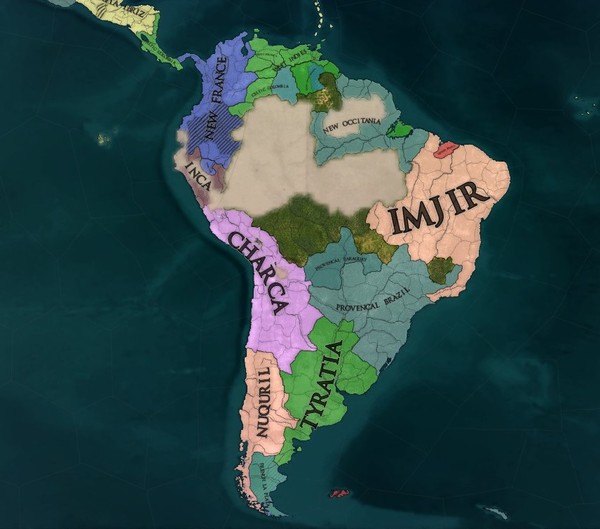
 : The northern continent is where the jewel of the Andalusi Empire lays, however, in our autonomous Muqti of Ibriz. The Hishami family rule as hereditary governors, responsible for everything from maintaining a standing army to mining for gold.
: The northern continent is where the jewel of the Andalusi Empire lays, however, in our autonomous Muqti of Ibriz. The Hishami family rule as hereditary governors, responsible for everything from maintaining a standing army to mining for gold. : Ibriz isn’t exactly… large, however, with constant feuds and wars in the old world hampering its expansion in the new. This has allowed Morocco and the Celtic Empire to quickly grow in the Caribbean and Albionoria, whilst the exiled kingdom of New England rules the eastern seaboard. The native Tlapanec Empire has also survived the initial waves of colonisation, whilst the Polynesian Waono kingdom has gradually risen to dominate the western coast.
: Ibriz isn’t exactly… large, however, with constant feuds and wars in the old world hampering its expansion in the new. This has allowed Morocco and the Celtic Empire to quickly grow in the Caribbean and Albionoria, whilst the exiled kingdom of New England rules the eastern seaboard. The native Tlapanec Empire has also survived the initial waves of colonisation, whilst the Polynesian Waono kingdom has gradually risen to dominate the western coast. 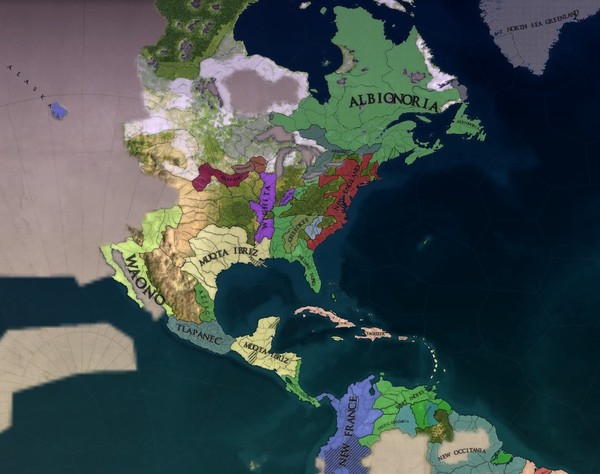
 : That brings our collection of maps to an end. In the interest of giving the Majlis an informed account of the powers of the world, however, I’ve also managed to gather a collection of statistics that I’m sure many here will be interested in.
: That brings our collection of maps to an end. In the interest of giving the Majlis an informed account of the powers of the world, however, I’ve also managed to gather a collection of statistics that I’m sure many here will be interested in. : First, the largest army in our region (and possibly the world) is almost definitely that of France, whose levies had swollen to almost 100000 men before our brave Andalusi Army crushed them on the field. Both Novgorod and the Celtic Empire are close runner-ups, however, with each boasting an army numbering 80000 men. We are... faltering in that department, admittedly, but one Andalusi is equal to ten Frenchmen!
: First, the largest army in our region (and possibly the world) is almost definitely that of France, whose levies had swollen to almost 100000 men before our brave Andalusi Army crushed them on the field. Both Novgorod and the Celtic Empire are close runner-ups, however, with each boasting an army numbering 80000 men. We are... faltering in that department, admittedly, but one Andalusi is equal to ten Frenchmen!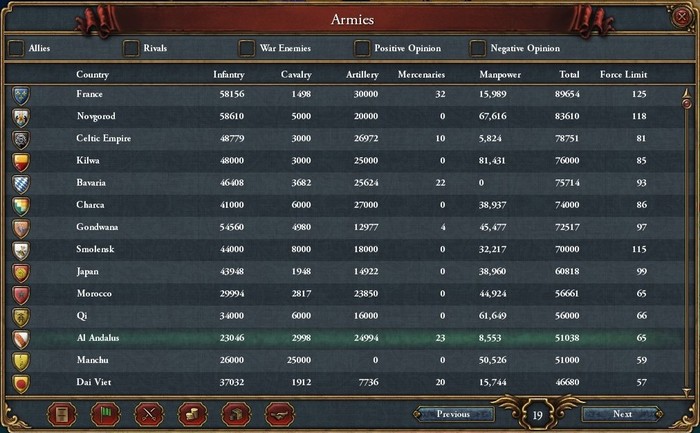
 : Next, let us consider something very important to our sultanate: the navy.
: Next, let us consider something very important to our sultanate: the navy.  : The Andalusi Fleet was annihilated during the Fitna, and our deep debt and constant war has prevented its reconstruction. In our place, the Celtic Empire and Morocco now rule the waves, presenting a serious problem whenever war arises between our nations. We'll have to construct a new war fleet sooner or later, or our colonies will never be safe.
: The Andalusi Fleet was annihilated during the Fitna, and our deep debt and constant war has prevented its reconstruction. In our place, the Celtic Empire and Morocco now rule the waves, presenting a serious problem whenever war arises between our nations. We'll have to construct a new war fleet sooner or later, or our colonies will never be safe.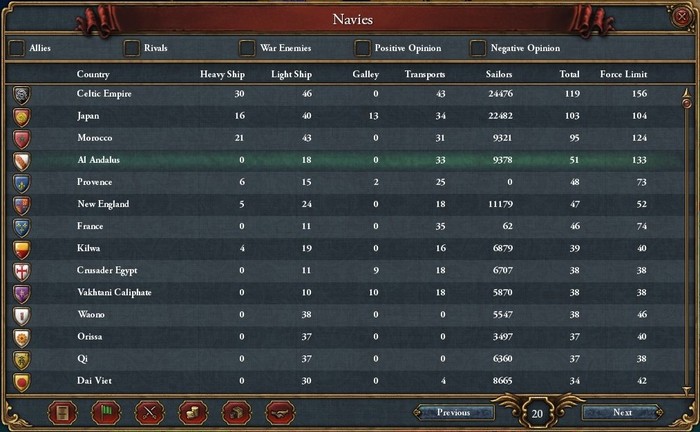
 : This is all very daunting, I’m sure, but I can also provide this assembly with some good news. Qadis – the capital of Iberia – is amongst the most populous and richest cities in the world, unequalled throughout Europe and beyond.
: This is all very daunting, I’m sure, but I can also provide this assembly with some good news. Qadis – the capital of Iberia – is amongst the most populous and richest cities in the world, unequalled throughout Europe and beyond.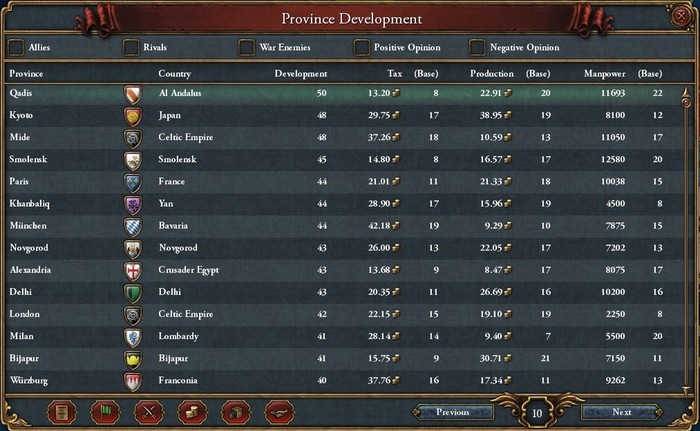
 : In addition to this, we are still very influential on the world market, the prestige of Al Andalus is not so easily eroded! And once we can get our trade fleet up and running again, we’re sure to have a dominating hand in all the most valuable trade nodes.
: In addition to this, we are still very influential on the world market, the prestige of Al Andalus is not so easily eroded! And once we can get our trade fleet up and running again, we’re sure to have a dominating hand in all the most valuable trade nodes. 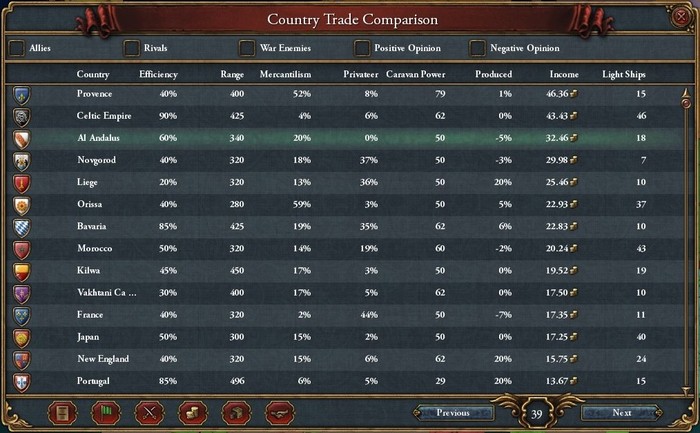
 : The past century has been hard on our peninsula, there is no denying that, but I’m certain that a stronger and more powerful Al Andalus shall rise from its ashes. I promise you all, when we come knocking, all the world will hear.
: The past century has been hard on our peninsula, there is no denying that, but I’m certain that a stronger and more powerful Al Andalus shall rise from its ashes. I promise you all, when we come knocking, all the world will hear.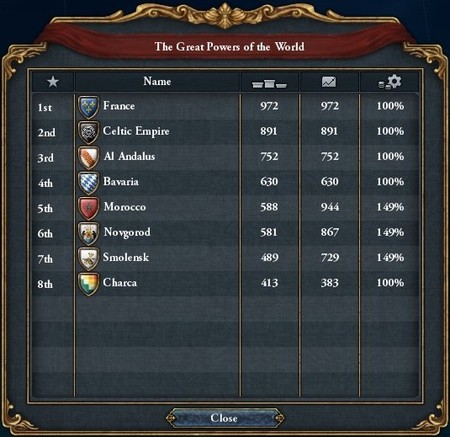
 : And that, my good lords, brings this talk to an end. I hope it enlightened many a man in this hall, and will help mould the shape of your future policies. Al Andalus shall be ascendant once more!
: And that, my good lords, brings this talk to an end. I hope it enlightened many a man in this hall, and will help mould the shape of your future policies. Al Andalus shall be ascendant once more!Political world map:

Religion world map:
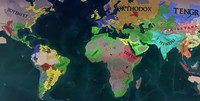
Culture world map:
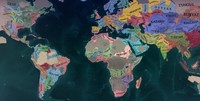
Technology world map:
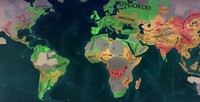
Our current techs:
